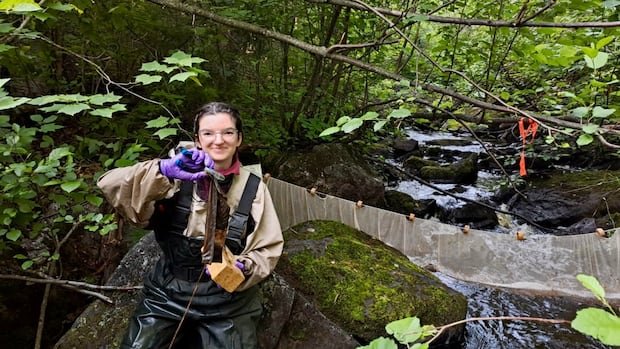Researchers from Trent University are currently engaged in a study in the forests and streams of northwestern Ontario to investigate the impact of forestry practices and climate change on brook trout populations and freshwater ecosystems. The team is specifically concentrating their efforts in the Walkinshaw and Wolf watersheds, situated northeast of Thunder Bay, focusing on headwater streams that play a vital role in feeding larger water bodies in the Great Lakes region.
Explaining the research focus, PhD student Celeste Milli, who is leading the fieldwork, highlighted the significant disturbances being experienced by northern freshwater ecosystems due to forest harvest and climate change. Of particular concern is the rise in water temperatures as a result of climate change, with uncertain implications for stream ecosystems. Brook trout, being highly sensitive to temperature changes, are being studied as key indicators of ecosystem health, given their preference for cooler environments and susceptibility to temperature shifts.
To gather data, the researchers are employing a mix of traditional and advanced techniques, such as electrofishing to temporarily immobilize fish for measurement and counting, alongside environmental DNA sampling to estimate populations without disrupting the ecosystem. Samples of insects and biofilm are also being collected to better understand the impacts of forest management and temperature variations on the aquatic food chain.
The project, overseen by Andrew Tanentzap, Canada Research Chair in Climate Change and Northern Ecosystems, is a collaborative effort with the Canadian Forest Service, Fisheries and Oceans Canada, and Ontario’s Ministry of Natural Resources. The ultimate goal is to utilize the research findings to enhance forest management practices for the protection and conservation of aquatic biodiversity and freshwater health.
Milli emphasized that the research outcomes could play a crucial role in shaping evidence-based policies for Canada’s northern forests, ensuring the resilience of forest ecosystems and freshwater resources amidst changing climatic conditions. The team aims to share their results with federal partners in the coming years, paving the way for informed decision-making in safeguarding these vital ecosystems.

